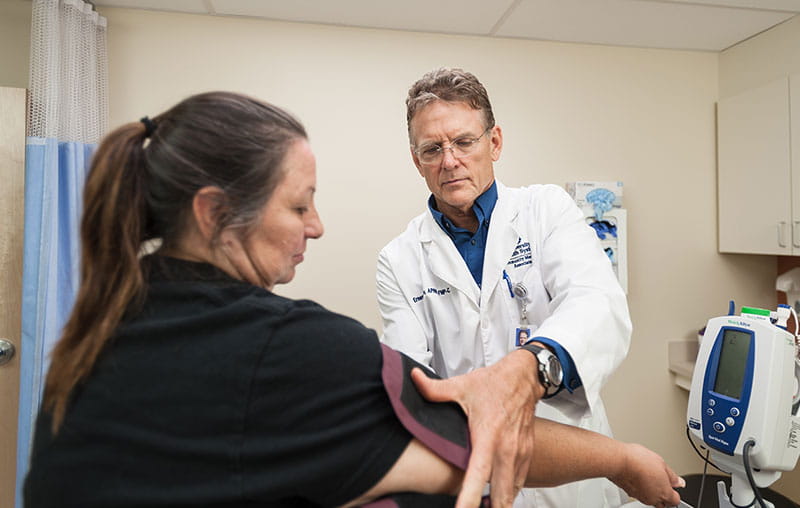Although the term “heart failure” can be alarming, many people live normal lives for longer periods through early diagnosis and treatment. Heart failure is actually quite common, affecting nearly 6.5 million Americans over the age of 20.
What Is Heart Failure?
To clear up a common misconception, heart failure does not mean that your heart stops. Rather, it is a condition that occurs when the heart’s ability to do its job is reduced.
“Heart failure can occur when the heart isn’t able to pump enough blood out to the rest of the body and vital organs, or it can also happen when the heart becomes stiff over time,” says Dr. Katherine Dodd, a heart failure cardiologist who practices at University Hospital. “Heart failure is a serious condition, but it’s manageable for many patients.”
People can go undiagnosed for a long time says Dr. Dodd. “Frequently, patients are surprised to hear that they have heart failure. That’s because heart failure typically begins slowly and worsens over time, and patients get to a tipping point when they really start to feel poorly. To complicate it further, often symptoms don’t reveal themselves until advanced stages of heart failure or the symptoms are interpreted as typical signs of aging, a cold, the flu or something else entirely.”
Symptoms of Heart Failure
According to the Heart Failure Society of America, there are three stages of heart failure symptoms. They develop in each person differently and can appear in a series of symptoms or at the same time. They include:
Breathing Difficulties
- Shortness of breath from simple activities – like walking stairs, eating, dressing
- Difficulty breathing when resting
- Waking up breathless
- Needing more than two pillows to sleep
- Tiring easily – not being able to exercise
- Frequent coughing
- Coughing that produces a mucus or blood-tinged sputum
- Dry cough when lying in bed
Congestion of the right side of the heart
- Swelling of feet, ankles or legs
- Increased trips to the bathroom at night
- Swelling of the abdomen
- Lack of appetite and nausea
Low cardiac output
- Fatigue
- Cold legs and arms
- Difficulty concentrating
Heart Failure Risk Factors
There are a number of risk factors that lead to an increased probability of heart disease. Age is a big factor says Dr. Dodd. The likelihood of heart failure goes up significantly beyond the age of 65. She says additional risk factors for heart failure include:
- Heart attack
- Family history of heart failure
- High blood pressure
- Abnormal heart rhythms
- Coronary artery disease (fat deposits cause blockages in arteries to the heart)
- Damage to heart valves / enlargement of the heart / heart murmur
- Diabetes
- Obesity
“I make it a priority to educate my patients about changes they can make on a daily basis that can help lead to a better quality of life,” Dr. Dodd explains. “Some heart disease issues or conditions can be improved through regular exercise including cardiac rehab, lowering the amount of salt in the diet, losing weight and taking action to reduce stress.”
Dr. Dodd also stresses the importance of keeping up with heart-related medications. “For many patients, good lifestyle choices can directly impact their overall health and improve their heart health as well,” she says.
4 Stages of Heart Failure
The American Heart Association and the American College of Cardiology collaboratively created a heart failure rating system so that the degree of heart failure of each patient can be evaluated with a standardized approach.
There are four stages of heart failure:
- Stages A and B include those who are at risk of developing heart failure including patients who have coronary artery disease, high blood pressure, diabetes or other high-risk conditions that can contribute to heart damage.
- Stage C includes patients with past or existing symptoms of heart failure who have structural heart disease, such as aortic valve stenosis, heart valve disease, cardiomyopathy, myocarditis, mitral valve regurgitation and many more conditions.
- Stage D includes patients who have advanced heart failure that is more challenging to treat.
How Is Heart Failure Treated?
According to the American Heart Association, heart failure can’t be cured. However, therapies, treatments and medication can help to improve a person’s heart failure symptoms and manage the condition. Heart failure doesn’t mean that your heart stops, but many who have this condition do have an enlarged heart that has to work harder to do its job. Having a weak heart or heart problems can lead to the need for placement of a defibrillator, shock box, heart pump or even heart transplantation when necessary.
The AHA says common treatment options for heart failure include:
- Lifestyle changes – eating healthier and exercising
- Medications – a major form of treatment helping improve symptoms and helping the heart pump more efficiently
- Surgical procedures or device implantation when needed
- Ongoing care – this is critical as patients can feel okay one day and have significant heart failure symptoms the next day
“With the advances in heart failure medications and innovative heart procedures and surgeries with better outcomes - heart failure patients have promising outlooks,” concludes Dr. Dodd. “This is especially true for those who have good insight and actively participate and contribute to their own health going forward.”
Heart Care at University Health
University Health offers a number of diagnostic and treatment options for those with heart failure. Learn more on our website.

Heart disease is the leading cause of death for both men and women.
Our free online risk assessment only takes a few minutes. It will help you better understand your risk of developing heart disease and how you may be able to lower it.




